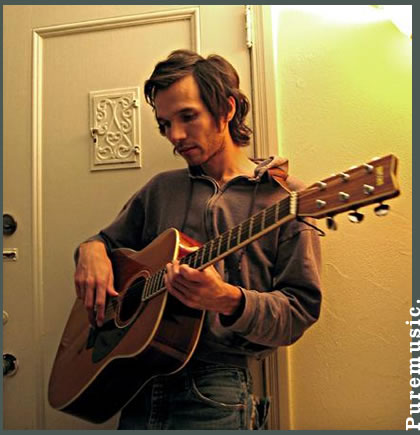
A Conversation with
Ferraby Lionheart
(continued)
PM: The opener on the new record, "Un Ballo Della Luna," has a very unusual fingerstyle guitar track, kind of like a Merle Travis part that turns in on itself, like it was Reverend Gary Davis or something. How did you learn or teach yourself the kind of guitar you're playing?
FH: I think it's just a natural thing. I never studied any kind of guitar style.
PM: Did you learn from--were some records or some players really important? Like so many of us, John Hurt was really important, this guy or that guy.
FH: I liked Joao Gilberto a lot. I like Brazilian music.
PM: Yeah, me too.
FH: And so I feel like I've been inspired by him. Between listening to him and other folk musicians, like American folk musicians, I've just sort of--I don't know, that song in particular, "Un Ballo Della Luna," it was a very spontaneous tune that came about when we were experimenting with some different miking and recording techniques at the studio. I was playing the nylon guitars through this little bullet mic which is traditionally a harmonica mic, and then running the bullet mic through a Fender Twin. [amplifier]
PM: [laughs] The nylon through the bullet into the Twin.
FH: Yeah. And then the reverb was all the way up on the Twin, and I was listening through headphones and just kind of goofing around with that little guitar part. And I was saying to the engineer that I was working with, "Oh, this sounds pretty cool. It would be cool if we just did a single mic recording like this, just the bullet mic picking up the vocal and the guitar." And I was just kind of goofing around with that little rhythm.
PM: And is that indeed how it went down?
FH: Yeah. I was like, "Oh, this is a nice song." I started sort of singing a melody over it. And then I was like, "Can you just push record on that?" And so I took the sketch home, and then wrote a lyric to it, then we recorded it the next day.
PM: That's beautiful. It's noteworthy, of course, that on your first label CD that you're the producer. How did that happen?
FH: Well, Nettwerk is just really supportive of the artist.
PM: Yeah, it's a really hip outfit.
FH: They're really progressive, and they're not really caught up with a lot of the typical major label agendas.
PM: Yeah, they're not following the old blueprint.
FH: Right. And so I've just sort of been producing my music so far, and they didn't require me to do it differently--kind of a "just keep doing what you're doing" sort of thing.
PM: It's beautiful. I bought your eponymous EP on iTunes this morning, which is also great. I thought that "The Ballad of Gus and Sam" was interesting because it had much more of a band sound going on.
FH: Yes.
PM: Although your voice sounded good in that construct, it seemed to point up the fact that the more acoustic and offbeat presentations of the songs made them sound and made your voice sound, too, much more special and unique. Would you agree with that, more or less?
FH: Yeah. I feel more comfortable when I can sing in a softer situation. I feel like I can do what I do better. Before I was doing this solo project I was in a rock band that was more similar to the sound of "Gus and Sam," and so that EP was sort of a prequel. I was still writing more like that. And I wouldn't say that I don't like to play rock music anymore. It's still fun to do sometimes, but it's true, I think that when I'm playing softer, more intimate music, I feel like I'm able to do what I do best, better.
PM: Although I was surprised how good your voice sounded in a rock band, too. It's impressive. continueprint (pdf) listen to clips puremusic home